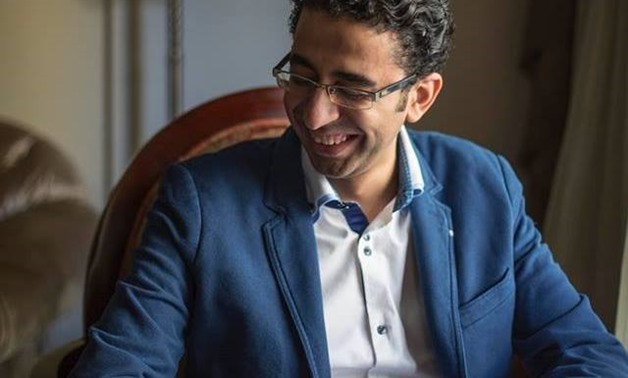
Haitham Dabbour- Photo courtesy of his official Facebook page
One of the most celebrated movies during the Gouna Film Festival (GFF), Photo- copy snatchedthe El Gouna Golden Star Award for the best Arabic Feature Nar-
rative Film at the closing ceremony of the GFF first edition on September 29. Written by talented script- writer Haitham Dabbour and directed by Tamer Ashry, Photocopy stars the veteran Mahmoud He- meida and Shereen Reda alsongside Farah Youssef, Aly Tayeb and Ahmed Dash.
Dabbour began his career with short movies and documentaries, with Tahrir 2011: The Good, the Bad and the Politician being the most famous. The documentary was split into three segments and directors Tamer Ezzat, Ay- ten Amin and Amr Salama each took over one part. “It screened in Egyptian cinemas in 2011 and was the first documentary to be featured commercially for a long time,” Dabbour says, adding “It was well received by the audience” when it premiered at the Venice and Toronto film festivals.
Dabbour later wrote a number of short movies for the BBC which were all nominated for awards. “One of my favorite short movies that was well re- ceived by all is Fardy (Individually), released in 2013 and starring Khaled El Nabawy. It was the first short movie starring El Nabawy,” Dabbour says, and was screened at the Tangier International Film Festival and BAFTA.
Dabbour then started working on long feature movies like Photocopy, a script that was nominated for the Sawiris Cultural Awards. He explains that he worked a lot on the script to develop it before reach- ing its final version, starting in 2013 and finishing over a year later, in 2014. “Photocopy represents a very special status to me, actually a unique, soft and tender one, not for me only, but for the hero and the heroine as well, the veteran actor Mahmoud Hemei- da and the heartthrob Shereen Reda who each plays a multilayered character,” Dabbour elaborates.
Photocopy tackles issues and problems facing the elderly, topics that are rarely addressed in Egyptian cinema. “The main challenge that faced me while writing such a different movie is to maintain high artistic sides and values, and at the same time remain amusing for the audience so they do not easily get bored,” explains Dabbour, who is proud of the balance he achieved. Carthage International Film Festival and other festivals have contacted the cast to screen Photocopy in their upcoming editions.
“What made me really proud that Photocopy won the best movie award at GFF is that the other competing movies were all high-quality movies, GFF management truly created an amazing mov- ies program. This is exactly what made it a precious award, to win while competing with strong movies,” says Dabbour who has just finished writing a movie script titled Eyar Nary (Cartridge). Shooting began last month with Karim El Shenawy directing. “The most important stage for any script is the develop- ment stage, it is even more vital than the writing stage, the final Photocopy script was the seventh one, and the last version of Eyar Nary that we are now shooting is the ninth,” says Dabbour.
Despite his successes, Dabbour, whose recent Ayesh (He Is Living) won the Sawiris Cultural Award in 2016 for best script, continues to work on devel- oping his talents. “The cinema market nowadays is different, you need to have a movie that not only can compete in the local market and achieve high rev- enues, but is also able to exist in international festi- vals and be appealing to the Egyptian, Arab, English and European audience,” he says. “You need to have a movie that you can communicate with the whole world with, this is the true challenge.”
That’s why Dabbour sees it is very important to discuss the script with artists from different cul- tures, because this will add to the movie. “For exam- ple, the movie storyline revolves around how a young person is strongly attached to his mother, this rela- tion is normal in the Middle Eastern culture, but for the Western one it is a little bit weird, so we must add another line to the script to make it easy for them to understand it, some may view this as a tiny detail, but these tiny details are what truly make great movies

Comments
Leave a Comment